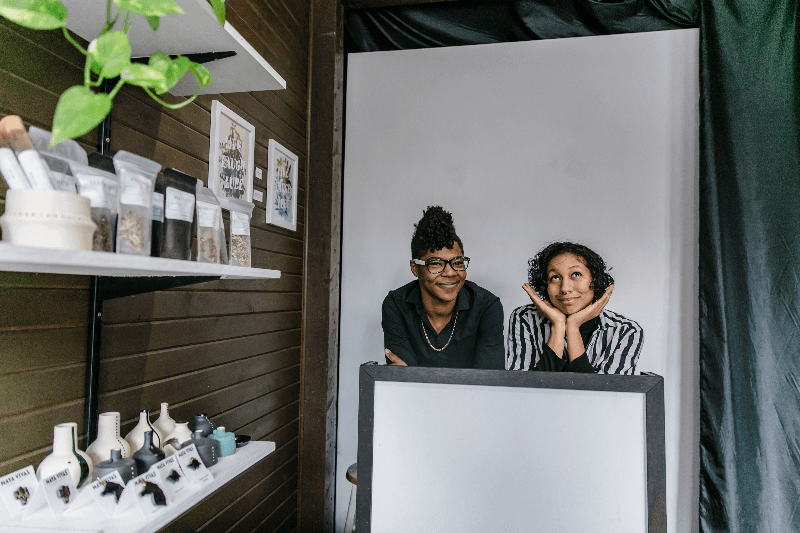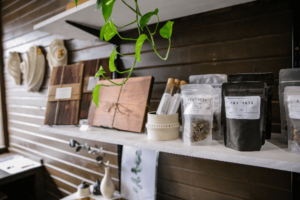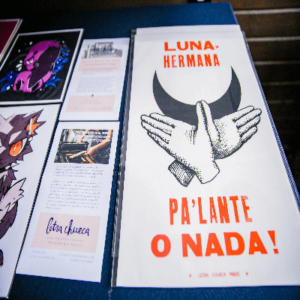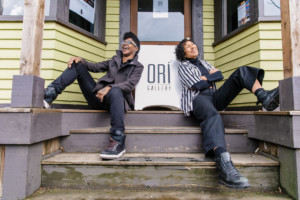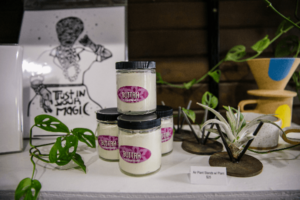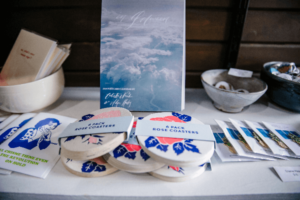“We’re not shy about the fact that we’re reclaiming space and trying to re-indigenize space…” says Haile. “We’re redefining what an art gallery is and can be for a community.”
Leila Haile | Co-Owner
Perched along either end of Portland’s historic Mississippi Avenue sit two Black-owned enterprises: a masonic lodge, symbolic of what once was predominantly Black Albina, and Orí Gallery, a new space for queer, trans, Black and other artists and activists of color.
From street level, it’s a short ascent to enter the gallery, apt given Orí is named after the West African Yoruba word meaning “head.” The name refers to one’s spiritual intuition and destiny, as well as the meditative, facial decorative practice associated with Yoruba tradition and practiced by the gallery’s co-directors, Maya Vivas and Leila Haile, who use they/them pronouns.
In comparison to the largely white, gentrified strip before it, the art gallery is an uncompromising outlier. “We’re not shy about the fact that we’re reclaiming space and trying to re-indigenize space,” says Haile. “We’re redefining what an art gallery is and can be for a community.”
Indeed, community is at the heart of Orí Gallery. Rotating exhibitions, artist talks, and a retail space offering the unique wares of artists unconfined by the legacy of exclusion in the white-dominant world of “fine art” are showcased on the regular. But the gallery also offers workshops on grant writing, art and direct action, and other topics that empower and galvanize those in its orbit to be disruptive agents of change within the wider Portland community. From their landlord, affordable housing-focused non-profit Portland Collective Housing, to the entryway ramp which allows the space to be ADA-accessible, Orí Gallery is an act of love and a case study in community investing in community.
The gallery, which opened in 2018, is the first collaboration between Haile, a long-time Portlander with a background in youth development, community organizing, and tattoo artistry, and Vivas, a relative newcomer to Portland with a background in ceramics and graphic design. In the non-profit and arts worlds respectively, both share a history of either being tokenized in the predominantly white spaces where they’ve felt accepted or not seen or represented at all in others.
“I kept running into barriers, and I wasn’t sure how much of it was just being an artist and navigating the art world…and how much of it [was] just racism,” explains Vivas. “I took the time to examine the roster of artists represented by these various galleries [in Portland] and there was literally no black femmes, no black women represented by any of these galleries.”
Speaking about their experience in tattoo school, Haile agrees, recalling, “Similar to Maya, I found a lot of frustrations in the good ole boy industry just as in the regular art world at large. It was…difficult to make it through school…to try to find my client base, to be taken seriously by other artists, and that kind of led to us being like f*** this, we’re sick of struggling and being seen as less than…”
What Vivas and Haile have accomplished through their gallery is not only a first for them, but also a first for Portland. And the fight to be recognized is now a little easier for them and so many others because of it.
Orí recently received a $5,000 Precipice grant from the Portland Institute for Contemporary Art. It has ongoing partnerships with PICA, Black Lives Matter, the Q Center, All African People’s Revolutionary Party (Portland chapter), and many more community-based organizations. Over a year into this project, the duo gush proudly when they talk about artists and youth they’ve mentored who have gone on to make their own trailblazing impacts in Portland and elsewhere. Those full-circle moments are especially gratifying when alums return to Orí Gallery for their own exhibitions, reminding Vivas and Haile why their work is important and needed in our community. To learn more about Orí Gallery, visit the website, oriartgallery.com. Sign up for the newsletter, and follow on Facebook and Instagram.
Storytellers
Author: Tiara Darnell
Photos: Tojo Andrianarivo
Published: March 2019


